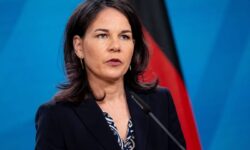

Twice in 2020, then-Baltimore State’s Attorney Marilyn Mosby swore she suffered financial hardship because of the coronavirus pandemic and sought tens of thousands of dollars from her city retirement fund.
Mosby received $80,000 in two disbursements and spent it on closing costs for a pair of properties in Florida she otherwise wouldn’t have been able to afford: an eight-bedroom house near Disney World and a condo on the Gulf Coast.
Federal prosecutors alleged impropriety both in the way Mosby obtained the money and the way she used it, saying she lied in both cases to benefit herself. A January 2022 indictment charged her with two counts of perjury and two counts of mortgage fraud.
In November, a jury heard evidence of all of the transactions but was tasked only with evaluating Mosby’s savings account withdrawals. Determining she lied about experiencing financial troubles related to COVID-19, the jury found Mosby guilty of perjury.
On Thursday, another jury will begin to focus on the former state’s attorney’s real estate purchases in the Sunshine State. Jury selection begins Tuesday.
Prosecutors say Mosby misled lenders by making several false statements on mortgage applications for both properties.
Defense attorneys contend that she didn’t knowingly lie and is innocent of the charges.
At stake for Mosby, a Democrat and mother of two who’s already experienced a steep fall from grace, is the possibility of being convicted of more crimes and the implications of that for her eventual punishment.
“A person who is convicted of a federal felony after going to trial, it’s reasonable to expect they’d go to prison for some period of time. And it’s more likely when they’ve been convicted of two separate federal crimes,” defense attorney Andrew I. Alperstein, a former prosecutor who is not involved in Mosby’s case, told The Baltimore Sun.
The story, according to prosecutors, began with the coronavirus raging across America in spring 2020. Against this backdrop, they said, Mosby saw opportunity to purchase real estate.
Prosecutors said Mosby didn’t have enough money to close on the homes she was interested in. She turned to the recently passed federal Coronavirus Aid, Relief, and Economic Security Act, which included a provision allowing government employees to access money from their retirement savings fund if they experienced coronavirus-related financial hardship.
Mosby requested $40,000 from her retirement fund on May 26, 2020, certifying under the penalty of perjury that she suffered “adverse financial consequences” because of the pandemic. She received $36,000 three days later.
After Mosby’s bids on several Baltimore properties fell through, she refocused her search on Florida.
On July 28, she signed an application for a $490,500 mortgage for an eight-bedroom house near Orlando, according to her indictment. Without the money from her retirement account, she would have been about $35,000 short on closing, an FBI accountant who reviewed Mosby’s financial records testified at the perjury trial.
In the mortgage application, Mosby certified she didn’t have any federal debts. In fact, she and her ex-husband, Baltimore City Council President Nick Mosby, had accrued some $69,000 in unpaid taxes and the IRS had placed a lien on their home in Baltimore, prosecutors have said.
Defense attorney David Walsh-Little, a former federal public defender and housing lawyer who’s not involved in Mosby’s case, told The Sun that mortgage fraud cases are particularly document-intensive.
“As anyone who has purchased a home knows, there is usually a dizzying amount of paperwork to be reviewed and signed at closing — usually in quick succession,” Walsh-Little said in an email. “The jurors will be expected to assess meaning to such documents possibly with the assistance of expert testimony, the circumstances surrounding the transaction, and the intent of the contracting parties.”
Mosby closed on the Orlando house in September. According to her indictment, she ratified an agreement with a property management company a week before closing, giving the business control of the house. That ran afoul of the so-called “second home rider” in her mortgage, in which she certified she would “maintain exclusive control” over the property.
“Had she applied for a non-owner-occupied mortgage and also disclosed the tax debt, the loan would not have been approved or closed,” a Baltimore mortgage expert previously told The Sun.
Despite her divorce in November, Mosby’s former spouse appears set to play a significant role in her defense. Defense lawyers long signaled their plans to call Nick Mosby to testify.
Ahead of trial, the defense lawyers sought U.S. District Judge Lydia Kay Griggsby’s approval to show the jury several out-of-court statements that seemed to support their theory that Mosby didn’t know she lied. Some of the statements pointed to Nick Mosby as being responsible for the couple’s taxes.
Griggsby declined to allow statements directly referring to Nick Mosby, including one where a banker recalled Mosby saying she believed the tax lien was “Nick’s issue” and another where the same banker remembered Nick Mosby saying the tax issue was “my obligation.”
Attorney Andrew Radding, a former federal prosecutor and criminal defense lawyer who is not involved in Mosby’s case, said Griggsby’s rulings made Nick Mosby’s testimony more important to the defense.
“They need him. If they get him on [the witness stand], and he says ‘I did the taxes. She didn’t even look at them. She just signed them. She didn’t know there was a lien. I didn’t tell her,’” Radding said, it would be helpful to Mosby’s defense.
Mosby’s story would come most clearly through her own voice, but allowing her to testify is a risky decision for the defense because Griggsby also ruled prosecutors could ask her about her perjury conviction, Radding and Alperstein said.
“I don’t see her taking the stand. I don’t see how she can help herself,” Radding said.
If Mosby slipped up during questions from her attorneys, he added, “the prosecutors can go after everything.”
Added Alperstein: “Although the judge will instruct the jury that you’re only to consider the dishonest act to determine whether you believe Mosby is telling the truth, not to consider that she did something dishonest before so she’ll do it again, the risk to the defense is that the jury won’t follow that instruction.”
Griggsby ordered the trial split into two at the request of Mosby’s lawyers.
The former state’s attorney chose not to testify during her perjury trial after prosecutors previewed several questions they planned to ask to undermine her credibility. Ahead of the mortgage fraud trial, they said her perjury convictions served as valuable evidence for the jury to decide whether to believe her.
Griggsby gave the defense permission to show the jury a text message Mosby sent to her Florida mortgage broker in March 2021. Mosby sent a link to a news story about the second home rider, asking, “Is this even accurate (sic).”
The judge also held off on deciding about allowing a comment from the broker to investigators. The broker recalled Mosby calling him after finding out about the tax lien “livid because it was news to her” and “she thought her husband took care of it,” according to court records.
Witnesses typically aren’t allowed to testify about what someone else said. But Mosby’s lawyers argued the broker’s comment was admissible because they weren’t trying to prove it was true.
“We are trying to show what she thought and that is critical because the government has to prove what she thought to get a conviction,” said Cullen Macbeth, one of her federal public defenders, at a pretrial hearing Jan. 5.
According to her indictment, Mosby also failed to disclose the federal tax debt on a second mortgage application for a condo in Longboat Key. Prosecutors said her lies didn’t stop there.
Mosby sent a letter Dec. 10 to the mortgage company saying she’d been living at her house near Orlando for the last 70 days, when she’d been in Baltimore several times over that time frame. She wrote that she wanted to buy a beachside condo in the same subdivision as her sister.
“My sister convinced a mutual friend of ours along with his wife and children to purchase one of the units as their second home and now I’m hoping to do the same,” Mosby wrote.
The letter prompted the mortgage company to change the condo from a primary to a secondary residence, according to her indictment.
Though Mosby got $45,000 from a late December withdrawal from her retirement fund under the CARES Act, she was still short $4,600 of the down payment required at closing for the condo in February 2021.
Prosecutors said she authored a “gift letter” in which she said Nick Mosby would transfer her $5,000 at closing. The eventual payment didn’t come from her ex-husband, according to her indictment, but from a series of transfers investigators traced back to her checking account.
Experts said she likely resorted to such a letter because lenders typically look at your account balance only once during the closing process to determine your interest rates.
———
EMEA Tribune is not involved in this news article, it is taken from our partners and or from the News Agencies. Copyright and Credit go to the News Agencies, email [email protected] Follow our WhatsApp verified Channel









